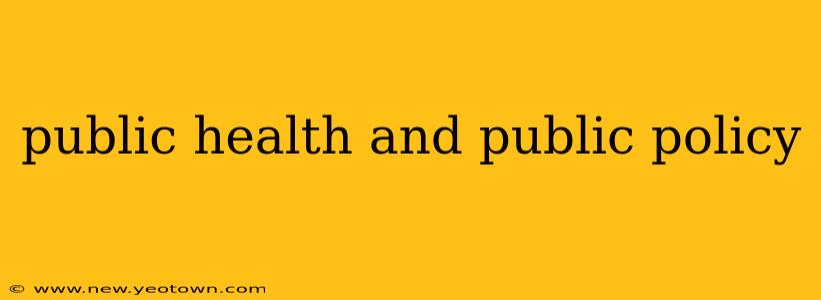Public health and public policy are inextricably linked. Imagine a bustling city: its vibrant markets, its bustling streets, its diverse population. This city's health – the well-being of its citizens – isn't just a matter of individual choices; it's a complex tapestry woven from societal structures, economic factors, and the policies that govern them. Public health professionals work tirelessly to understand this tapestry, while policymakers grapple with translating that understanding into effective action. This is a story of collaboration, but also of conflict – a constant negotiation between scientific evidence, political priorities, and the very real needs of the people.
What is Public Health?
Public health isn't simply about treating individual illnesses; it's a broader, societal approach focusing on preventing disease and promoting wellness within communities. Think of it as a proactive guardian, anticipating threats and fortifying the community's defenses. This involves everything from monitoring infectious disease outbreaks to advocating for healthier food options, from promoting vaccination campaigns to addressing social determinants of health like poverty and inequality. It's a field fueled by data, driven by evidence, and committed to improving the overall health and well-being of populations.
How Does Public Policy Impact Public Health?
Public policy acts as the lever, the mechanism through which society addresses public health challenges. These policies, created at local, national, and international levels, set the stage for action. A strong tobacco control policy, for example, significantly reduces smoking rates and associated diseases. Similarly, robust environmental regulations can minimize pollution and protect against environmental hazards. Investment in public health infrastructure – hospitals, clinics, research institutions – directly impacts the quality and accessibility of healthcare services. The impact can be seen, quite literally, in years added to lives and improvements in the quality of life.
What are the Challenges in Aligning Public Health and Public Policy?
The relationship isn't always harmonious. Several challenges exist in effectively aligning public health needs with policy decisions.
Funding and Resource Allocation:
Often, public health initiatives face fierce competition for limited resources. Other pressing societal needs – education, infrastructure, defense – all vie for a share of the public budget. This makes securing adequate and sustained funding a constant struggle for public health programs. This lack of consistent funding can lead to setbacks, hindering progress toward long-term health goals.
Political Ideology and Public Opinion:
Policy decisions are often influenced by political ideologies and public opinion, which can clash with evidence-based recommendations from public health professionals. Controversial issues such as vaccination or gun control highlight this tension, where political divides can hinder the implementation of effective public health measures.
Implementation and Enforcement:
Even when effective policies are enacted, successful implementation and enforcement are crucial. This often requires collaboration between multiple government agencies, community organizations, and healthcare providers. Lack of coordination or inadequate enforcement can undermine the impact of well-intentioned policies.
What Role Do Public Health Professionals Play in Policymaking?
Public health professionals play a vital role in informing and shaping public policy. They act as crucial intermediaries, translating complex scientific data into easily understood recommendations for policymakers. They contribute to evidence-based policymaking by conducting research, analyzing data, and providing expert testimony. Their advocacy skills are vital in ensuring that the voices of affected communities are heard. They effectively bridge the gap between scientific understanding and political action.
How Can We Improve the Alignment of Public Health and Public Policy?
Strengthening the alliance between public health and public policy requires a multifaceted approach:
- Increased Funding: Securing consistent and adequate funding for public health programs is paramount.
- Public Awareness: Promoting public understanding of public health issues and the importance of evidence-based policy is essential.
- Community Engagement: Involving communities in policy discussions is vital to ensuring that policies are relevant and impactful.
- Interdisciplinary Collaboration: Fostering collaboration between public health professionals, policymakers, and other stakeholders is crucial.
- Long-Term Vision: Adopting a long-term perspective on public health investments, recognizing that health outcomes are not immediate but rather the result of sustained efforts.
The relationship between public health and public policy is a dynamic one. It's a continuous dialogue, a constant negotiation between science and politics, between evidence and action, between the needs of the individual and the health of the community. By strengthening this collaboration, we can create healthier, more equitable, and resilient societies.

